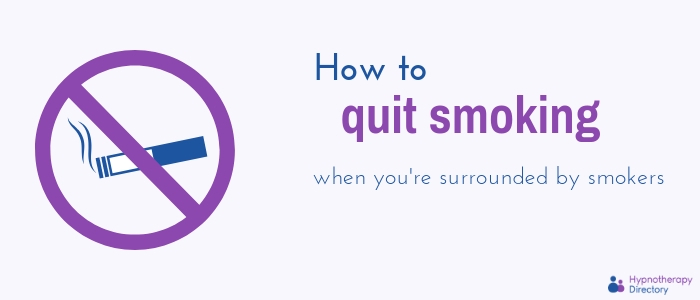Friday, 12 October 2018
Have You Got The Right Mindset?
How to quit smoking when surrounded by smokers

As one in five adults in the UK is a regular smoker, it’s likely that if you’re trying to quit smoking, encountering smokers regularly will certainly test your will-power.
Social smoking and drinking go hand in hand in the UK pub culture, and regular cigarette breaks with colleagues have become the norm in the office workplace. But with the startling statistic that nearly 50% of all smokers die prematurely due to smoking-related diseases, there isn’t a better time to extinguish for good, than right now.
Beating an addiction will be difficult, frustrating and require lots of determination. But, with the right support, you can get there. When it feels like the rest of the world is lighting up, read our top tips for achieving your quitting goals.
Set expectations.
Whether that’s with friends, family, colleagues or a partner, make sure you communicate your quitting plans and what you hope to expect from those around you. If your partner smokes, make plans to ensure they smoke outside, cigarettes are kept out of sight and they don’t give you a cigarette (even if you ask for one), etc. Ensure your surround yourself with a supportive network who know you are serious and dedicated to the cause, and can help you along your journey.
Detox your social media.
Unfortunately, in our society, we can’t escape digital adverts that follow us around the web. But you can actively unfollow any accounts or websites on your social channels that have you reaching for the packet of cigarettes. In this case, out of sight out of mind will help combat your internal habit reminder that it’s time for a cigarette.
 Plan for nights out.
Plan for nights out.
It’s very common that a night out on the town will ensure slip-ups, so plan ahead. If you know you can’t resist a quick smoke with your beer, take something with you to occupy your mind. It sounds silly, but download a game on your phone so when your friends pop out for a cigarette, lose yourself for five minutes in the game. You’ll quickly realise that distraction is a powerful tool.
Join a group.
Surround yourself with a positive group who are on the same journey as you. They can offer you support and understanding that your friends may not truly be able to give. A quit smoking group is dedicated to one collective goal and will be readily available with tips and tricks to combat your cravings, social pressures and quitting difficulties.
A simple google search for your local hospital and its smoke-free services is the best way to reach fellow quitters and support groups.
Get active.
Ex-smokers have often said that they miss having something to hold or fiddle with. It might be worth investing in a small stress ball or any small toy that you can hold or squeeze when a craving is particularly apparent.
Reassess why you smoke.
If smoking is a treat for you, consider what other treats you allow yourself and what they give you. A stressful day could be eased with a quiet bath or a glass of your favourite wine – which could be savoured rather than hampered with the taste of nicotine.
Our final note is to get all the help you can! Quitting smoking is life-changing and, at any age, you can do it. Seeking professional help in the form of a hypnotherapist can be an effective treatment for smoking. By breaking negative thought patterns and behaviours associated with smoking, you can see the cigarette in its true form, rather than what it symbolises to you.
Monday, 1 October 2018
Hypnotherapy: Commonly asked questions

Hypnotherapy can sometimes feel like it’s shrouded in mystery. Those who don’t work in the industry or those who haven’t tried it before can feel unsure about the practice, and often have questions.
Here at Hypnotherapy Directory, our aim is to lift the curtain and show the world how powerful hypnotherapy can be. We want to take the mystery away and educate as many people as possible on the ways hypnotherapy can support us.
Below we’ve listed some of the questions we often hear when people want to know more about hypnotherapy. Our hope is to share these answers far and wide and encourage more people to consider hypnotherapy.
Can hypnotherapists control me when I’m in a hypnotic state?
This is a common misconception. Hypnotherapists aim to put you in a deeply relaxed state and communicate with your unconscious – and while you’ll be more open to suggestion, you won’t do anything you don’t want to do.
Will I remember what happened during the session?
Many people remain aware of what’s happening in their hypnotherapy session, some feel as if they’ve had a nap and don’t remember the details. This will vary from person to person, but generally, people leave their sessions feeling calm, relaxed and centred.
What can hypnotherapy help with?
Hypnotherapy can help with a wide range of concerns. Where it really shines is when a change in habit is required. We’ve found the following areas of concern to be highly searched for on our site:
Weight loss – For those looking to be more mindful with their diet, hypnotherapy can be a helpful way of encouraging more intuitive eating habits.
Anxiety – A hypnotherapist can help those with anxiety learn how to access a calmer state of mind more easily and increase relaxation.
Quit smoking – Powerful at changing habits, hypnotherapy can be an excellent method to quit smoking.
Addictions – As with smoking, overcoming other addictions such as alcohol addiction, drug addiction and gambling addiction can be supported with hypnotherapy.
Phobias – Many people find hypnotherapy helpful for tackling phobias, including fear of flying, claustrophobia, arachnophobia and much more.
Insomnia – Not being able to sleep can affect both mental and physical health over time. Many people use hypnotherapy to help overcome sleep disorders like insomnia.
Irritable bowel syndrome (IBS) – Hypnotherapy is recognised by the National Institute for Health and Care Excellence (NICE) as an effective treatment for IBS.
Will it work if I’m sceptical?
As we mentioned earlier, a hypnotherapist cannot make you do anything you don’t want to. Having a willingness to change and an open mind is key to the success of hypnotherapy. If you go into the session not really wanting to change or totally against the idea of hypnotherapy, you’re unlikely to get the most from it.
How many sessions will I need?
This will depend on the type of hypnotherapy you’re having and the nature of the problem you’re seeking help with. Some people may only need one session, while others will require longer-term treatment. Your hypnotherapist may also recommend self-hypnosis after your sessions to help you keep up momentum.
What should I look for in a hypnotherapist?
Having a trusting relationship with your hypnotherapist is important, so it helps if you can find out more about the way they work before booking an appointment. Ensuring they are appropriately qualified and insured is also recommended.
How can I find a hypnotherapist?
We have a nationwide network of hypnotherapists here, all of whom are either registered with a professional body or have shown us appropriate qualifications or insurance. If you use our advanced search you can find a list of hypnotherapists in your local area and then read through their profiles to learn more about them before booking a consultation.